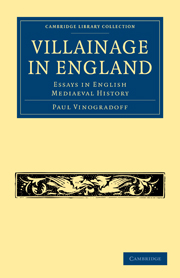Book contents
- Frontmatter
- PREFACE
- Contents
- INTRODUCTION
- FIRST ESSAY: THE PEASANTRY OF THE FEUDAL AGE
- CHAPTER I THE LEGAL ASPECT OF VILLAINAGE. GENERAL CONCEPTIONS
- CHAPTER II RIGHTS AND DISABILITIES OF THE VILLAIN
- CHAPTER III ANCIENT DEMESNE
- CHAPTER IV LEGAL ASPECT OF VILLAINAGE. CONCLUSIONS
- CHAPTER V THE SERVILE PEASANTRY OF MANORIAL RECORDS
- CHAPTER VI FREE PEASANTRY
- CHAPTER VII THE PEASANTRY OF THE FEUDAL AGE. CONCLUSIONS
- SECOND ESSAY: THE MANOR AND THE VILLAGE COMMUNITY
- APPENDIX
- INDEX
CHAPTER IV - LEGAL ASPECT OF VILLAINAGE. CONCLUSIONS
Published online by Cambridge University Press: 16 May 2011
- Frontmatter
- PREFACE
- Contents
- INTRODUCTION
- FIRST ESSAY: THE PEASANTRY OF THE FEUDAL AGE
- CHAPTER I THE LEGAL ASPECT OF VILLAINAGE. GENERAL CONCEPTIONS
- CHAPTER II RIGHTS AND DISABILITIES OF THE VILLAIN
- CHAPTER III ANCIENT DEMESNE
- CHAPTER IV LEGAL ASPECT OF VILLAINAGE. CONCLUSIONS
- CHAPTER V THE SERVILE PEASANTRY OF MANORIAL RECORDS
- CHAPTER VI FREE PEASANTRY
- CHAPTER VII THE PEASANTRY OF THE FEUDAL AGE. CONCLUSIONS
- SECOND ESSAY: THE MANOR AND THE VILLAGE COMMUNITY
- APPENDIX
- INDEX
Summary
Method of investigation
I have been trying to make out what the theories of the lawyers were with regard to villainage in its divers ramifications. Were we to consider this legal part of the subject merely as a sort of crust superposed artificially over the reality of social facts, we should have to break through the crust in order to get at the reality. But, of course, the law regulating social conditions is not merely an external superstructure, but as to social facts is both an influence and a consequence. In one sense it is a most valuable product of the forces at play in the history of society, most valuable just by reason of the requirements of its formalism and of those theoretical tendencies which give a very definite even if a somewhat distorted shape to the social processes which come within its sphere of action.
The formal character of legal theory is not only important because it puts things into order and shape; it suggests a peculiar and efficient method of treating the historical questions connected with law. The legal intellect is by its calling and nature always engaged in analysing complex cases into constitutive elements, and bringing these elements under the direction of principles. It is constantly struggling with the confusing variety of life, and from the historian's point of view it is most interesting when it succumbs in the struggle.
- Type
- Chapter
- Information
- Villainage in EnglandEssays in English Mediaeval History, pp. 127 - 137Publisher: Cambridge University PressPrint publication year: 2010First published in: 1892

